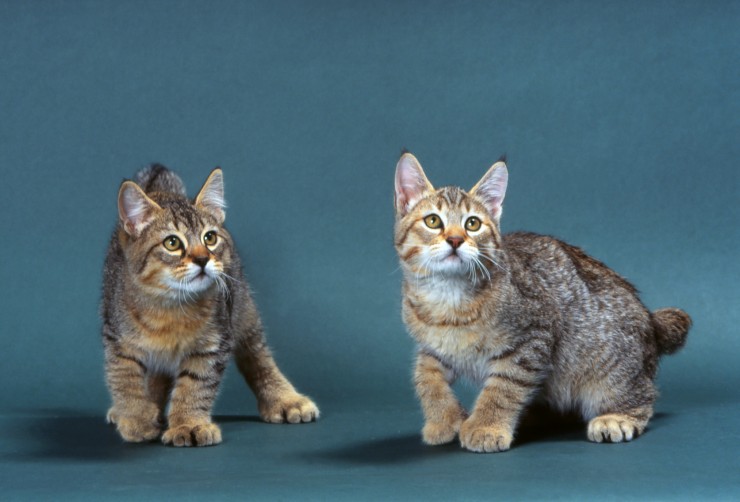

There are many lovely looking cats in the world that boast striking and unique features. One of them is the Pixie Bob with their adorable looks and shorter than short tails. In fact, some of the breed are born with no tail at all whereas others might boast pretty long ones. However, it's not just the fact these cats are tailless that makes so popular, it's also because they have some very endearing ways about them, especially when they start chatting to you with their many chirps and growls.
Like so many other breeds with shorter or stumps for tails, the Pixie Bob could suffer from spinal issues all caused by the deformity that's found at the tip of their spine which is responsible for the fact they don't have tails like other cats. The Manx cat is another tailless breed that suffers from a condition called Manx syndrome which is very similar. With this said, there could be a variety of genetic mutations responsible for the various breeds having shorter or stumpy tails, but this physical trait is caused by a defective gene which can also impact other areas of a cat's spine causing problems and neurological issues.
In the case of the Manx cat, if two cats with the defective gene are bred, the result could make these problems even worse. Their offspring could be stillborn or they may die very soon after they are born. With this said, it is known that other tailless cat breeds suffer the same scenario although in the case of the Pixie Bob, more research needs to be carried out in order to establish whether this is as true of the breed as it is of the Manx cat. As such, breeders should avoid using two tailless Pixie Bobs in a breeding programme as a way of reducing the chances of their offspring being born with very severe spinal or neurological health issues.
The other issue with Pixie Bobs is that some of them are born with extra toes which makes them polydactyl and this too can cause problems in the breed which is why breeders are advised not to use a polydactyl cat in a breeding programme as a way or reducing the risk of kittens inheriting this physical trait. The problem with the breed is that not enough information is currently available for vets and other interested parties to establish just what hereditary disorders the breed might be predisposed to suffer from. In short, it is only with time that this information would become available.
What is known, however, is that the smaller the gene pool happens to be, the greater the risk of kittens being born with hereditary and/or congenital health disorders. Because newer pure breeds like the Pixie Bob are developed by crossing other more "established" pedigree cats, the problem many breeders face is that newer breeds could just inherit the disorders seen in both their parent breeds.
It would be fair to say that the majority of pure bred cats can inherit genetic health disorders and may develop acquired health issues during the course of their lives. If you have set your heart on sharing your home with a Pixie-Bob cat, it's essential that you contact a reputable breeder who would be only too happy to discuss health issues with you and to introduce you to a kitten's litter mates and their parent cats. If a breeder is not willing to do this, it's best to leave them well alone and contact another breeder.
There is some evidence that the Pixie-Bob cat could be more sensitive to specific drugs and medications as well as vaccinations so if you do get a kitten or an older cat, it is worth discussing these concerns with the vet who would be inoculating and treating your pet should they ever fall ill or injure themselves.
In order to keep your Pixie-Bob as healthy as possible, you have to make sure they are fed the correct sort of diet to suit their ages throughout their lives and to ensure they live in the safest of environments which can at times be challenging when you own a cat that's allowed to spend time in the great outdoors. The other thing you need to keep an eye on is your cat's weight because obesity is a massive problem and one that could seriously impact your cat's lifespan.
The Pixie-Bob is a lovely looking cat and one of the newer breeds that's become extremely popular to own here in the UK. If you have set your heart on getting a kitten, it's really important to contact a reputable and well-established breeder who would be only too happy to introduce you to a litter's parents so you get to judge how friendly they are. Because the breed is so new, more time needs to pass before vets can establish if Pixie-Bobs are predisposed to certain hereditary and congenital health disorders often seen in their parent breeds.
Copyright © 2005-2016 Pet Information All Rights Reserved
Contact us: www162date@outlook.com